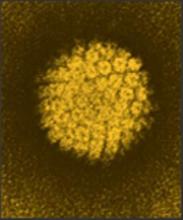About one-third of male teens in the United States reported receiving at least one dose of human papillomavirus vaccine, and only 13.9% received a complete series of three doses of the vaccine, although coverage among male adolescents significantly increased from 2010 to 2013, a study showed.*
Dr. Peng-jun Lu of the Centers for Disease Control and Prevention and his associates used data from the 2013 National Immunization Survey–Teen, a national, random-digit-dial telephone survey sponsored by the CDC, to gather information from 6,039 adolescents between the ages of 13 and 17 years. They found coverage of greater than or equal to one dose was significantly higher among non-Hispanic blacks (42.2%) and Hispanics (49.6%), compared with non-Hispanic whites (26.7%). Similarly, human papillomavirus (HPV) vaccination coverage of three or more doses was significantly higher among non-Hispanic blacks (15.7%) and Hispanics (20.3%), compared with non-Hispanic whites (11.1%).
Parents who did not have their sons receive any HPV vaccinations commonly thought that the provider did not recommend them (24.0%), believed that the vaccinations were not needed or not necessary (18.9%), and had a general lack of knowledge (16.4%), the authors reported.
“To further increase HPV vaccination coverage … efforts should be directed to provide comprehensive, accessible, and appropriate communication messages on HPV and HPV vaccine directed to male adolescents and parents,” the researchers concluded.
Read the full article in Pediatrics (doi: 10.1542/peds.2015-1631).
*Correction, 11/4/2015: An earlier version of this story misstated the number of doses of the vaccine received by the study participants. A total of 34.6% reported receiving at least one dose.


